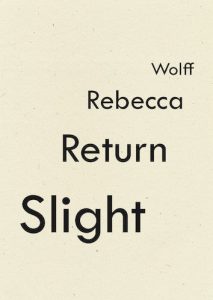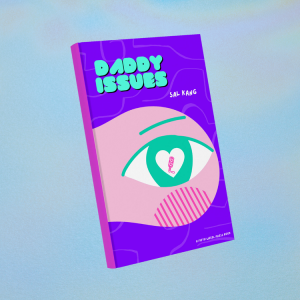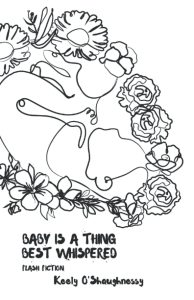Poetry. 116 pgs. Wave Books. October 2022. 9781950268658.
Rebecca Wolff’s stunning new collection, Slight Return, (forthcoming from Wave Books), attacks culture with a sharp knife of fragmented lines and lucid dreaming. Resisting definition, metaphor, and categorization, these poems take on the obsessions of the self, the terror of consumer culture, and fear of the unknown, all with extreme clarity of language. In Wolff’s poetic world, no words are wasted, no clause is excessive, and nothing is extraneous. She has trimmed down these poems, distilled them to their purest forms, and the result is a tincture that will cure the world of its ills.
At times, Wolff is extremely funny, at other times, desperate. In “If I were more orderly” she states:
I don’t know do you love me even crazy? what does crazy mean. Do you love me
even bad. what does bad mean.
I murdered someone. I just want to say that at the outset
flat out
side of the head with a shovel or pickax, something blunt but sharp: corpse overboard.
and then I lied about it worse made art about it (Wolff, 19).
This is a rare moment of humanity in these poems, which are often more abstract than this, but the end result is refreshing. The speaker in these poems rarely references their own emotions, but rather comments on what they seem to see as the human condition, and the little blips of emotional lability that slip through the cracks make these poems fresh and human. In other moments, Wolff gets more abstract, but still remains grounded in the physical world:
poop into a bucket
water the poop make tea
pour the tea on the kale experiment so far it is all going according to plan
avocado in the salad
shell of avocado in the compost fruit flies in the wine bath (Wolff, 18)
This is an example of the humor that runs as a thread through all of these poems. Although there is humor, they are not light. Rather, they examine the insecurities that we all have about missing out on intrinsic parts of culture, life, and the world at large, and play on these insecurities. Wolff dilutes her own personal fears and our larger cultural fears into just a few lines. The balance of personal and universal is delicate, but manages to be successful throughout.
Stylistically, these poems are predominantly free verse, with a few prose poems frantically sprinkled throughout. Wolff’s strong voice resonates through the free verse, reverberating through the minimalist lines. In the prose poems, however, she really shines:
Doting fan of synchronicities, or deluded victim—victim I say— of concentric models in which I am centric. Not centrist or eccentric but centric, and the radio talks to me and the songs individually have messages for me and the weather responds to my needs and glorifies, sometimes characterizes me. All these are available and understood diagnostically and philosophically, everyone is looking at me. A revelation to understand that at least it is patently untrue that everyone is looking at me, everyone is concerned with my status or situation or who I am going to sit next to at the dinner table at the art colony. Everyone, child, listen to me, everyone is far too concerned with who they are going to sit next to at the dinner table at the art colony to spare even one moment. (Wolff, 53)
The frenetic pace of these prose poems lends itself particularly to the anxiety of Wolff’s work. She is able to utilize her penchant for repetition and wordplay, something that appears in many of the other poems, but not to such great effect as in these prose poems. Directly addressing the reader, she frees herself from the binds of traditional verse and keeps the viewer engaged in her spinning top world, where up is down and diagonal is the only way to move. The repetition gives way to irony, a vital streak throughout the work.
There is no irony with which
I apprehend this ancient cultural wisdom
materially accessible to me just because on my couch I can
access on my iPhone from iTunes (27)
Addressing ironic moments head-on, Wolff speaks to all of our anxieties about consumer culture and its effects on our headspace. She does so with her trademark humor and lightheartedness, but there is a throughline of darkness. Modern life, with all its trappings and tribulations, becomes a joke in Wolff’s writing, but it is also pervasive and tantalizing, all-consuming, and all-knowing. Cell phones in particular are a recurring theme in this work, and their effect on our psyche; the anxiety and relief they produce. When the poem turns into the personal, later in the work, and we see Wolff on her phone again, we are terrified, because she speaks to all our fears, however universal. She bares herself in a truly confessional fashion, and we recognize ourselves in the poem:
No, Rebecca, he hasn’t
that cheap habit you have of magical thinking, that’s gotten you in a lot of trouble: the kind nobody needs, nobody needs to think magically of him, he’s not worth it, he’s not magic like that, and the narrative in which you and he are magically connected and speak to each other telepathically with your hearts, well that’s a stagnant tragic comedy of error, a hyperindividualistic binge watch starring you and you alone. My hand in my pocket I withdraw
to look, and look again: he has. (80)
Magical thinking is the perfect description for this collection—in reading, we are suspending disbelief in reality, and entering Wolff’s world, where up is down, and things are not what they seem. The lucidity of this collection is a trick, because although at times Wolff seems perfectly coherent, she is really weaving a web of delicious irony and fake panic. With ever-changing form, content spanning the whole of human history, and the occasional blatant confessional, Wolff has created an outcry for modern anxiety. In “I know what I’ll do I’ll pretend you’re dead,” Wolff claims:
so literal,
revise my memoir to include the irredeemable losses,
so real as to be visible
your death to me
I used to say
you were dead to me (87)
In this fake death, Wolff denigrates her captors and tormentors, and takes back her agency. But there is no real taking back. Rather, one can only move forward. Wolff seems to ignore this fact, and the title of this collection denotes that—Slight Return—returning to the scene of the crime, returning to the same problems or questions over and over again. This book is a rumination, a pondering, a quest. At the end, we can only hope that Wolff has answered her own questions. It’s not clear if she has. Perhaps she will continue to return, over and over, for years, as many of us do.
Slight Return is available through Wave Books. Purchase it now through their website.
Like what you’re reading?
Get new stories or poetry sent to your inbox. Drop your email below to start >>>
OR grab a print issue
Stories, poems and essays in a beautifully designed magazine you can hold in your hands.
GO TO ISSUESNEW book release
Ghosts Caught on Film by Barrett Bowlin. Order the book of which Dan Chaon calls “a thrilling first collection that marks a beginning for a major talent.”
GET THE BOOK



